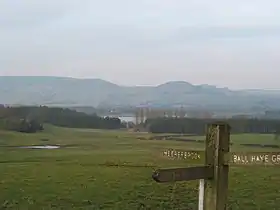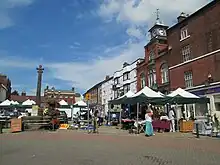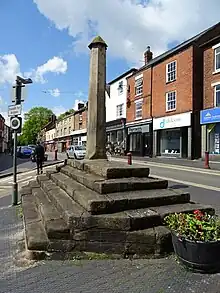Staffordshire Moorlands District | |
|---|---|
 Tittesworth reservoir in the Staffordshire Moorlands | |
 Staffordshire Moorlands shown within Staffordshire | |
| Sovereign state | United Kingdom |
| Constituent country | England |
| Region | West Midlands |
| Non-metropolitan county | Staffordshire |
| Status | Non-metropolitan district |
| Admin HQ | Leek |
| Incorporated | 1 April 1974 |
| Government | |
| • Type | Non-metropolitan district council |
| • Body | Staffordshire Moorlands District Council |
| • MPs | Karen Bradley Bill Cash |
| Area | |
| • Total | 222.4 sq mi (575.9 km2) |
| • Rank | 67th (of 296) |
| Population (2021) | |
| • Total | 95,993 |
| • Rank | 248th (of 296) |
| • Density | 430/sq mi (170/km2) |
| • Ethnicity | 97.6% White |
| Time zone | UTC0 (GMT) |
| • Summer (DST) | UTC+1 (BST) |
| ONS code | 41UH (ONS) E07000198 (GSS) |
| OS grid reference | SJ9821356633 |
Staffordshire Moorlands is a local government district in Staffordshire, England. Its council is based in Leek, the district's largest town. The district also contains the towns of Biddulph and Cheadle, along with a large rural area containing many villages. North-eastern parts of the district lie within the Peak District National Park.
The area's principal industries are agriculture, fashion and tourism. Visitor attractions include the National Trust property Biddulph Grange, the Churnet Valley Railway, the UK's largest theme park Alton Towers Resort, and the annual Leek Arts Festival.[1] There are also a variety of outdoor pursuits such as rock climbing (The Roaches), sailing (Rudyard Lake) and cycling (Waterhouses).
The neighbouring districts are East Staffordshire, Stafford, Stoke-on-Trent, Newcastle-under-Lyme, Cheshire East, High Peak and Derbyshire Dales.
History
Historically the area was contained in the Hundred of Totmonslow, except for the parish of Biddulph, which was in Pirehill Hundred. The district makes up the majority of the area of the now obsolete Totmonslow Hundred, with the remaining area of the Hundred now falling in East Staffordshire District. The Hundred was named after a small hamlet of Totmonslow in the parish of Draycott in the Moors, which is within Staffordshire Moorlands District.[2]
The district was created on 1 April 1974 under the Local Government Act 1972 covering four former districts, which were all abolished at the same time:[3]
- Biddulph Urban District
- Cheadle Rural District
- Leek Rural District
- Leek Urban District
The new district was named Staffordshire Moorlands, reflecting the landscape of this sparsely populated and largely upland part of the county.[4]
In February 2008, the council formed a strategic alliance with the neighbouring High Peak Borough Council to share a number of services and staff as a way of reducing costs, including a shared chief executive and senior management team.[5][6]
Governance
Staffordshire Moorlands District Council | |
|---|---|
 | |
| Type | |
| Type | |
| Leadership | |
Andrew Stokes since September 2020[8] | |
| Structure | |
| Seats | 56 councillors |
Political groups |
|
| Elections | |
| First past the post | |
Last election | 4 May 2023 |
Next election | 6 May 2027 |
| Meeting place | |
| Moorlands House, Stockwell Street, Leek, ST13 6HQ | |
| Website | |
| www | |

Staffordshire Moorlands District Council provides district-level services. County-level services are provided by Staffordshire County Council.[9] The whole district is also covered by civil parishes, which form a third tier of local government.[10]
Large parts of the district are within the Peak District National Park. In those areas, town planning is the responsibility of the Peak District National Park Authority.[11] The district council appoints one of its councillors to serve on the 30-person National Park Authority.[12]
Political control
The council has been under no overall control since the 2023 election, being led by a Labour minority administration.[13]
The first elections were held in 1973, initially operating as a shadow authority alongside the outgoing authorities until the new arrangements came into effect on 1 April 1974. Political control of the council since 1974 has been as follows:[14]
| Party in control | Years | |
|---|---|---|
| No overall control | 1974–1991 | |
| Independent | 1991–1995 | |
| No overall control | 1995–2007 | |
| Conservative | 2007–2011 | |
| No overall control | 2011–2015 | |
| Conservative | 2015–2019 | |
| No overall control | 2019–2022 | |
| Conservative | 2022–2023 | |
| No overall control | 2023–present | |
Leadership
The leaders of the council since 1999 have been:[15]
| Councillor | Party | From | To | |
|---|---|---|---|---|
| Ted Perry[16] | Conservative | May 1999 | 2003 | |
| Ron Locker[17] | Ratepayers | 2003 | 6 May 2007 | |
| Sybil Ralphs[18][19] | Conservative | 19 May 2007 | 4 May 2022 | |
| Paul Roberts | Conservative | 4 May 2022 | 17 May 2023 | |
| Mike Gledhill | Labour | 17 May 2023 | ||
Composition
Following the 2023 election, the composition of the council was:[20]
| Party | Councillors | |
|---|---|---|
| Labour | 24 | |
| Conservative | 22 | |
| Independent | 8 | |
| Green | 1 | |
| Liberal Democrats | 1 | |
| Total | 56 | |
The next election is due in 2027.
Elections
Since the last boundary changes in 2003 the council has comprised 56 councillors representing 27 wards, with each ward electing one, two or three councillors. Elections are held every four years.[21]
Staffordshire Moorlands is the local UK Parliament constituency. Its boundaries do not match up with the District Council area. The MP since 2010 has been Karen Bradley, a Conservative. She served as Secretary of State for Culture, Media and Sport from 14 July 2016 until 8 January 2018, when she was appointed Secretary of State for Northern Ireland.
Premises
The council is based at Moorlands House on Stockwell Street in Leek.[22] The front part of the building facing Stockwell Street was formerly called New Stockwell House and had been built in 1937 as the headquarters of the Leek and Moorlands Building Society (later the Leek and Westbourne Building Society).[23] The building was acquired in early 1974 as part of the preparations for the local government reorganisation later that year.[24] A large extension including a new main entrance was added to the rear of the building in 1986, after which the building was renamed Moorlands House.[25]
Geography


The Staffordshire Moorlands district is in the southern end and foothills of the Pennines, with some of the northern parts lying in the Peak District National Park. The terrain is mostly uplands to the north of the district and lower-lying to the south, with rolling hills, crags and valleys across forests and lakes.[26] The upland terrain is divided into high gritstone moorlands of the Dark Peak in the northwest and limestone landscape of the White Peak in the northeast. The district is named after the moors in the northwest along with smaller patches of lowland heaths across the district, such as Wetley Moor near Werrington.[27] The highest point in both the district and Staffordshire is Cheeks Hill, rising up to 520m (1,710 feet) on Axe Edge Moor.
The area approximately between Axe Edge Moor and the Churnet Valley is in the Dark Peak and includes the Roaches, a series of gritstone outcrops which rises to 505m (1,657 feet) and where several red-necked wallabies roamed free for many years.[28] On the other hand, the western half of Dovedale and the Manifold Valley, including Thor's Cave, Wetton Mill, Longnor and Butterton, are in the White Peak. The Churnet Valley is a steep-sided, wooded valley in the south of the district, running between Cheddleton and Rocester, also known as "The Rhineland of Staffordshire" or Staffordshire's "Little Switzerland".[29][30]
The Staffordshire Moorlands is also home to the highest village in Britain, Flash. The village stands at 463m (1,518 feet) above sea level. This record was confirmed in 2007 by the Ordnance Survey after Wanlockhead in Scotland also claimed the record. The BBC's The One Show investigated the case in a bid to settle the argument and Flash turned out to be the higher of the two.
The council maintains a number of local nature reserves including Biddulph Valley Way, Brough Park Fields, Cecilly Brook, Hales Hall Pool, Hoften's Cross Meadows, Ladderedge Country Park and Marshes Hill Common.[31]
Towns and parishes


The whole district is covered by civil parishes. The parish councils for Biddulph, Cheadle and Leek have declared their parishes to be towns, allowing them to take the style "town council". The small parish of Blore with Swinscoe has a parish meeting rather than a parish council. The parishes are:[32]
- Alstonefield
- Alton
- Bagnall
- Biddulph
- Blore with Swinscoe
- Bradnop
- Brown Edge
- Butterton
- Caverswall
- Cheadle
- Checkley
- Cheddleton
- Consall
- Cotton
- Dilhorne
- Draycott in the Moors
- Endon and Stanley
- Farley
- Fawfieldhead
- Forsbrook
- Grindon
- Heathylee
- Heaton
- Hollinsclough
- Horton
- Ilam
- Ipstones
- Kingsley
- Leek
- Leekfrith
- Longnor
- Longsdon
- Oakamoor
- Onecote
- Quarnford
- Rushton
- Sheen
- Tittesworth
- Warslow and Elkstones
- Waterhouses
- Werrington
- Wetton, Staffordshire
Twinnings
Staffordshire Moorlands has twinning agreements with:
References
- ↑ Leek Arts Festival
- ↑ History, Gazetteer and Directory of Staffordshire by William White, pub. Sheffield, 1834
- ↑ "The English Non-metropolitan District (Definition) Order 1972", legislation.gov.uk, The National Archives, SI 1972/2039, retrieved 17 November 2023
- ↑ "The English Non-metropolitan Districts (Names) Order 1973", legislation.gov.uk, The National Archives, SI 1973/551, retrieved 31 May 2023
- ↑ "Tenders and contracts". Staffordshire Moorlands District Council. Archived from the original on 15 August 2016. Retrieved 9 July 2016.
- ↑ "Alliance councils welcome new Chief Executive". High Peak Borough Council. Retrieved 25 July 2023.
- ↑ "Council minutes, 17 May 2023". Staffordshire Moorlands District Council. Retrieved 30 December 2023.
- ↑ Jackson, Leslie (30 October 2020). "Alliance councils welcome new chief executive after two officers quit". In Your Area. Retrieved 24 July 2023.
- ↑ "Local Government Act 1972", legislation.gov.uk, The National Archives, 1972 c. 70, retrieved 31 May 2023
- ↑ "Election Maps". Ordnance Survey. Retrieved 25 July 2023.
- ↑ "Planning". Peak District National Park Authority. Retrieved 23 July 2023.
- ↑ "Our members by appointing authority". Peak District National Park Authority. Retrieved 23 July 2023.
- ↑ Price, Richard (19 May 2023). "Deadlock broken as Labour takes control of Staffordshire Moorlands District Council". Stoke-on-Trent Live. Retrieved 30 December 2023.
- ↑ "Compositions calculator". The Elections Centre. Retrieved 9 September 2022.
- ↑ "Council minutes". Staffordshire Moorlands District Council. Retrieved 15 September 2022.
- ↑ "The leader of the council". Staffordshire Moorlands District Council. Archived from the original on 18 October 2002. Retrieved 15 September 2022.
- ↑ "Moorlands Messenger, Autumn 2003" (PDF). Staffordshire Moorlands District Council. Archived from the original (PDF) on 27 September 2003. Retrieved 15 September 2022.
- ↑ "Council minutes, 19 May 2007". Staffordshire Moorlands District Council. Archived from the original on 27 September 2011. Retrieved 15 September 2022.
- ↑ Price, Richard (16 April 2022). "Sybil Ralphs replaced as leader of Staffordshire Moorlands Conservatives". Stoke Sentinel. Retrieved 15 September 2022.
- ↑ "Local elections 2023: live council results for England". The Guardian.
- ↑ "The District of Staffordshire Moorlands (Electoral Changes) Order 2001", legislation.gov.uk, The National Archives, SI 2001/1448, retrieved 30 December 2023
- ↑ "Contact us". Staffordshire Moorlands District Council. Retrieved 31 December 2023.
- ↑ "The Leek and Moorlands Building Society: The New Head Offices". Evening Sentinel. Stoke-on-Trent. 28 October 1937. p. 5. Retrieved 31 December 2023.
- ↑ "Council may have HQ at ex-building society head office". Evening Sentinel. Stoke-on-Trent. 23 February 1974. p. 12. Retrieved 31 December 2023.
- ↑ "Topping out council HQ". Evening Sentinel. Stoke-on-Trent. 1 November 1986. p. 9. Retrieved 31 December 2023.
- ↑ Kent, Jeff, Staffordshire's 1,000-Foot Peaks, Witan Books, 2013, ISBN 978-0-9927505-0-3.
- ↑ "Werrington etc. and Wetley Moor" (PDF). Werrington. Werrington. Retrieved 23 June 2019.
- ↑ McCarthy, Michael (20 February 2013). "The decline and fall of the Peak District wallabies". The Independent. Archived from the original on 2022-05-24. Retrieved 12 March 2018.
- ↑ "Scenery around Alton". BB Doomsday Reloaded. Retrieved 27 April 2016.
- ↑ "Churnet Valley Railway". Churnet Valley Railway. Retrieved 27 April 2016.
- ↑ "Local Nature Reserves". Staffordshire Moorlands Council. Retrieved 29 January 2011.
- ↑ "Parish councils contact information". Staffordshire Moorlands District Council. Retrieved 31 December 2023.
